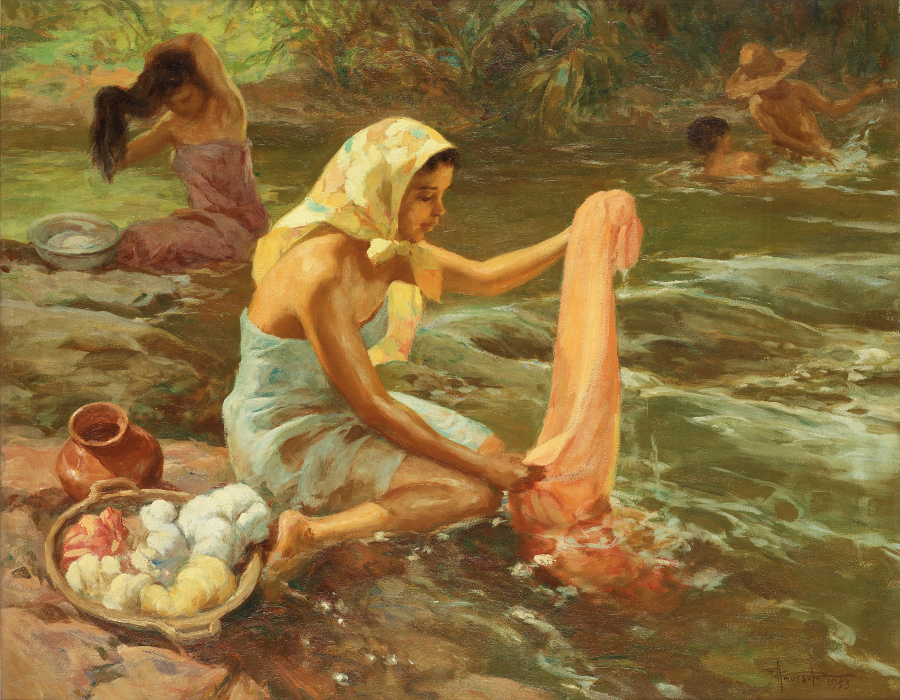
Soap has been around for nearly five thousand years. The discovery that the Mesopotamians made soap revolutionized the way people thought about soap… especially in regards to Mesopotamia.

The name “soap” was derived from Mount Sapo. Heat, ash and fat from animal sacrifices created a liquid soap that ran into a nearby river. Women washing clothes in that river noticed their laundry got a lot cleaner; plus, if one of their children had been swearing, washing his mouth out with the water taught him a valuable lesson.

Ivory Soap, the only soap that floats and smells like your grandma, was actually an accident. Too much air was mixed in giving it buoyancy. Fortunately, they were able to fix the manufacturing process by convincing the American public that they wanted floating soap.

The term “soap opera” comes from the 1930s when dreary repetitive radio dramas were sponsored by soap companies. If you’ve never seen a soap opera, they are basically pro-wrestling for shut-ins.

Soap started to be created on an industrial scale by the fifteen century. Sadly, they needed the industrial scale to weigh some bananas so soap production had to be put on hold.

A third of the world’s soap is used by the United States. Rumor is, a lot of it is being stockpiled to facilitate intense washing should we have to turn to cannibalism.

Soap is often an ingredient in industrial lubricants which makes it perfect for an already slippery bath or shower.

An analysis shows that, if everyone just washed their hands, 1.4 million lives could be saved. The same analysis shows that, if everyone just didn’t die, everybody could be saved.

What is commonly called “soap”, today, is not true soap. But, attempts to get people to call it “Cozbrak” failed utterly. At best you might be able to convince people to make quote marks with their fingers when saying “soap”…

In most soaps, there are toxins that should be avoided, according to people that make soaps that don’t have toxins. Regardless, you should eat no more than two bars a week.

I wonder why I didnt think and didnt know why they were called soap operas
LikeLiked by 1 person
Growing up in America in the sixties, I saw some were sponsored entirely by soap companies… as in “brought to you by…”…
LikeLiked by 1 person
makes sense given Americans consume so much soap, or do we blame the operas for subliminally inducing the need for more soap in the lives.
LikeLiked by 1 person
A lot of pressure had been brought to bear on housewives to be perfect. I blame Donna Reed. You may have to look her up…
LikeLiked by 2 people
I think its highly overrated, has anyone considered the impact on germs??? They will become extinct at this rate … like pubic lice. 😮
LikeLiked by 1 person
Well, if I know the powers that be, the germs will be put into “germ preserves” where they will be protected… until eaten by pubic lice, of course…
LikeLike
😊 Now that was good.
LikeLiked by 2 people
I love making soap
LikeLiked by 1 person
What type of fat do you use?
LikeLiked by 1 person
All kinds, from lard to olive oil.
LikeLiked by 1 person
I lived downwind from a soap rendering plant. It made me envy the people who lived near the dump.
LikeLiked by 2 people
Ivory Soap. Blech! For some reason I’ve always hated that smell… so of course it was all my mother used when I was young. Damn you Donna Reed!
LikeLiked by 1 person
I agree. Plus there’s something creepy about floating soap.
LikeLiked by 1 person
There is. Almost like it’s mocking you…
LikeLiked by 1 person
“At best you might be able to convince people to make quote marks with their fingers when saying “soap”…” I’m in! Happy for another opportunity to use finger quote marks 🙂 Can’t wait to talk to someone today. I will definitely drop the word “soap” at least once – even if “soap” has nothing to do with what we are talking about.
LikeLiked by 2 people
All the cool kids are talking about soap, Robyn…
LikeLiked by 1 person
I am so thankful for Google – half the time I have to look up what all the cool kids are talking about. I’ve always been the lost one. Thank goodness now I have you to help me with “soap” 🙂
LikeLiked by 1 person
My 26 year old son keeps me abreast on what’s cool… but, at least he’s smug about it…
LikeLike
I think either the country should be spelled Mesoapotamia instead of Mesopotamia, or soap should be spelled sop. Also, there is a soap called Pears which I presume is perfectly edible…but, to be on the safe side, you should probably wash it down with plenty of Irish Spring. And with that, I shall Dash off and think/presume no more (until next time). 😦
LikeLiked by 1 person
1. I agree on Mesopotamia and have a letter on its way to the American Archeological Institute.
2. I knew a porcupine named “Pears” and he was NOT edible, so BE CAREFUL!
3. Irish Spring smells like a breath of old Ireland, which could be nice or it might be a mix of vomit, dark beer and Shepard’s pie.
I appreciate your expertise.
LikeLike
Hm. I’ll adjust my diet accordingly. And watch for river flamingos.
LikeLiked by 1 person
I know much about them because I have written about them. They are weird.
LikeLiked by 1 person